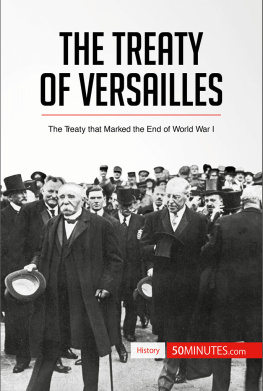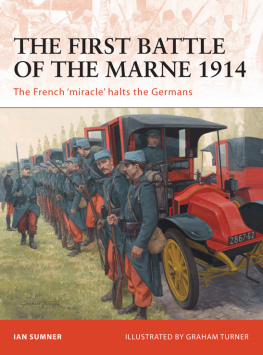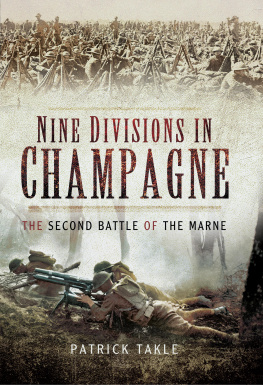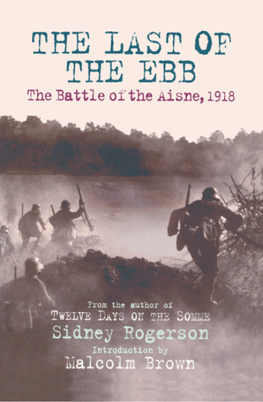50MINUTES.COM - The Battle of the Marne : the First Allied Victory of the First World War.
Here you can read online 50MINUTES.COM - The Battle of the Marne : the First Allied Victory of the First World War. full text of the book (entire story) in english for free. Download pdf and epub, get meaning, cover and reviews about this ebook. year: 2016, publisher: 50 Minutes, genre: History. Description of the work, (preface) as well as reviews are available. Best literature library LitArk.com created for fans of good reading and offers a wide selection of genres:
Romance novel
Science fiction
Adventure
Detective
Science
History
Home and family
Prose
Art
Politics
Computer
Non-fiction
Religion
Business
Children
Humor
Choose a favorite category and find really read worthwhile books. Enjoy immersion in the world of imagination, feel the emotions of the characters or learn something new for yourself, make an fascinating discovery.

- Book:The Battle of the Marne : the First Allied Victory of the First World War.
- Author:
- Publisher:50 Minutes
- Genre:
- Year:2016
- Rating:5 / 5
- Favourites:Add to favourites
- Your mark:
- 100
- 1
- 2
- 3
- 4
- 5
The Battle of the Marne : the First Allied Victory of the First World War.: summary, description and annotation
We offer to read an annotation, description, summary or preface (depends on what the author of the book "The Battle of the Marne : the First Allied Victory of the First World War." wrote himself). If you haven't found the necessary information about the book — write in the comments, we will try to find it.
The Battle of the Marne : the First Allied Victory of the First World War. — read online for free the complete book (whole text) full work
Below is the text of the book, divided by pages. System saving the place of the last page read, allows you to conveniently read the book "The Battle of the Marne : the First Allied Victory of the First World War." online for free, without having to search again every time where you left off. Put a bookmark, and you can go to the page where you finished reading at any time.
Font size:
Interval:
Bookmark:



- When: 6th-12th September 1914
- Where: In the north-east of France, between Paris and Verdun (on both sides of the Marne)
- Context: The First World War (1914-1918)
- Belligerents: Britain and France against the German Empire
- Commanders and leaders:
- John Denton Pinkstone French, British Marshal (1852-1925)
- Joseph Joffre, French General (1852-1931)
- Helmuth von Moltke, German General (1848-1916)
- Outcome: French victory
- Victims:
- German camp: approximately 43,000 dead, 173,000 wounded and 40,000 missing
- French camp: approximately 21,000 dead, 122,000 wounded and 84,000 missing
- British camp: approximately 3000 dead, 30,000 wounded and 4000 missing

- The Triple Alliance, created in 1882, included Germany, Austria and Italy;
- The Triple Entente, formed in 1907, brought together Britain, France and Russia.
- A rise of nationalism. National feelings were exacerbated because countries felt assaulted by others:
- France wished to take revenge on Prussia after its defeat in the Franco-Prussian War of 1870-1871, and thus to recover Alsace and Lorraine;
- Irredentism, an Italian nationalist movement demanding the land left to Austria-Hungary, was upset by the attitude and actions of Austria in the Balkans. Italy therefore felt frustrated in the Triple Alliance;
- In Germany, the rapprochement between France, Britain and Russia rose fears of encirclement. Conversely, Pangermanism (doctrine to unite all Germanic peoples and other countries under German domination) and its aspiration for a Greater Germany caused mistrust of Europe.
- The magnitude of the Eastern question (problem caused by the fragmentation of the Ottoman Empire and the resulting quarrel to dominate the Balkans). The Ottoman Empire was becoming weaker, causing not only the independence of the Balkan countries, but also competition between the European nations over the management of public services and the exploitation of natural resources, including oil.
- An opposition between Russia and Austria in the Balkan region. Both countries took advantage of the weakness of the Ottoman Empire to expand their areas of influence and gain sea access in the south. Indeed, Russia saw itself as a protector of the Slavic people, especially Serbia, while Austria did not like the Serbian nationalism which animated the Slavic minorities within the empire and threatened their stability;
- Tensions developed between Germany and France over colonial issues, particularly around those relating to Morocco. Germany tried to curb French expansion in this region. In addition, it provided support in 1902 to the Boers (descendants of Dutch settlers in South Africa) when Britain conquered their two states by force;
Font size:
Interval:
Bookmark:
Similar books «The Battle of the Marne : the First Allied Victory of the First World War.»
Look at similar books to The Battle of the Marne : the First Allied Victory of the First World War.. We have selected literature similar in name and meaning in the hope of providing readers with more options to find new, interesting, not yet read works.
Discussion, reviews of the book The Battle of the Marne : the First Allied Victory of the First World War. and just readers' own opinions. Leave your comments, write what you think about the work, its meaning or the main characters. Specify what exactly you liked and what you didn't like, and why you think so.











